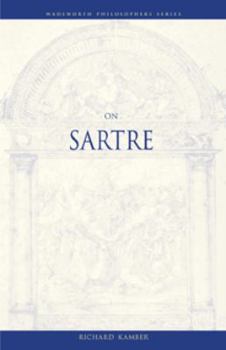Book Overview
This brief text assists students in understanding Sartre's philosophy and thinking so that they can more fully engage in useful, intelligent class dialogue and improve their understanding of course... This description may be from another edition of this product.
Format:Paperback
Language:English
ISBN:0534576249
ISBN13:9780534576240
Release Date:December 1999
Publisher:Wadsworth Publishing Company
Length:98 Pages
Weight:0.90 lbs.
Dimensions:0.3" x 5.1" x 8.1"
Customer Reviews
2 ratings
The Essential Sartre
Published by Thriftbooks.com User , 22 years ago
Just finished this book. It was a very excellent summing up of the great one's work, and I especially enjoyed the author's personal takes and commentaries on Sartre's ideas. I really enjoyed reading it and learned a great deal even as I found my mind being refreshed with much of what I was taught years ago in courses on Existentialism. I found the writing to be quite fluid and the theses, summations, arguments and commentaries to be highly understandable and enjoyable to read. I discovered a great deal in the 'Life and Works' section that I had not known before, and the presentation of Sartre's defense of direct realism was very cogent. The author's section discussing Sartre on Nothingness was excellent, and I felt an old thrill running through me as I was re-acquainted with 'the theft of my world', 'le regard', 'shame and pride' and 'the body'. The 'Ontology' section really helped focus and clarify Sartre's ideas for me. The author's discussion of 'free will and determinism' and his presentation of Sartre's ideas on these concepts was excellent. That "the being of human beings is freedom", the concept of bad faith, Sartre on theology and ethics and humanistic Existentialism all made the blood rush to my ears. I had a lot of powerful feelings reading these wonderfully profound and moving insights again. I am quite taken with the author's final statement "Although I agree that obligation to others is central to ethics, I believe this focus needs to overlap with an ethic of self-realization. It would be a shame to lose sight of the imperative of Existentialism to confront our freedom and create ourselves." This speaks so much to us of how we should be "in the world". The author answers beautifully all those endless and careless remarks that are constantly being made by those with no knowledge of Existentialism, who use the word to infer a philosophy of despair, gloom and hopelessness. It is, as the author says, so much the opposite... what could be more stimulating, challenging, thrilling, promising and ultimately 'human' than confronting one's freedom and creating oneself? Could there be anything more important or meaningful in a human life? I want to thank the author for a wonderful book. It goes on my favorite bookshelf.
Excellent
Published by Thriftbooks.com User , 23 years ago
I'm no expert on Sartre, but I decided to "review" this book because I found it a throughly enjoyable, informative and well-written introduction to the best known existentialist of the 20th Century.The book starts out with an introduction to Sartre and his place within existentialism. [pp. 1-6.] The second chapter is called "life and works" and is an excellent overview of Sartre's life which deals extensively with his literature and politics. [pp. 7-40.] The final chapters deal with Sartre's epistemology, ontology, psychology, and ethics. [pp. 41-95.] In these chapters, Prof. Kamber quotes extensively (but not excessively) from Sartre's works. The book contains equal amounts of praise and criticism and strikes me as fair and balanced. Although everything is cited, the book doesn't contain footnotes (which I find generally distract and aren't necessary in an introductory work).I have only a couple of criticisms of this work. First, Prof. Kamber is too easy on Sartre for his support of the Soviet Union. According to Prof. Kamber, Sartre did not break ties with the Soviet Union until the invasion of Czechoslovakia in 1968. [p. 35.] Since the crimes of the Soviet Union were well-known (such as committing genocide in the Ukraine) one would think there would be no excuse for having any ties with such a government at any time. Why Sartre decided to offer at least partial support for years to a nation that committed crimes greater than Nazi Germany's is a question worthy of some discussion. Second, the book doesn't contain a list of recommended books about Sartre.Prof. Kamber clearly put a great deal of effort to make this book readable and informative. I recommend it highly.




